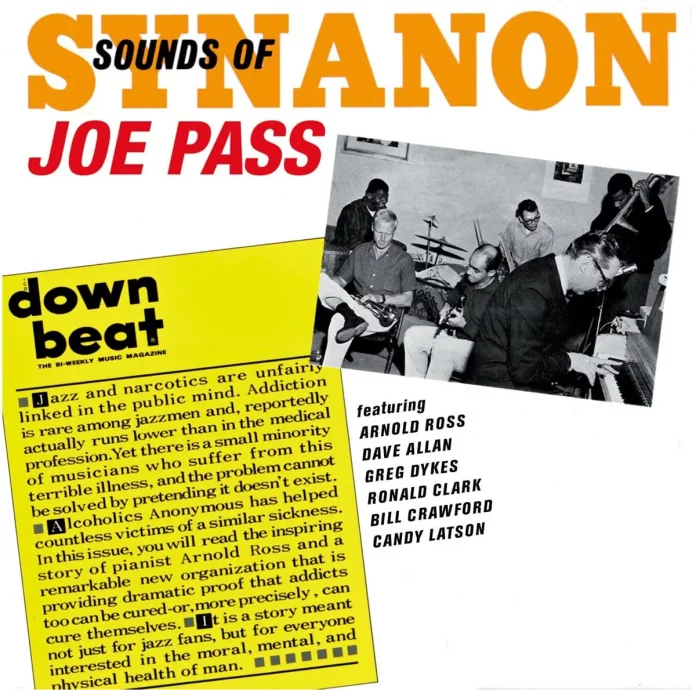This album, recorded when Pass – already a promising guitarist – was a recovering drug user at the pioneering Synanon Foundation rehabilitation centre in Santa Monica, California, marked a turning point in what was to become a long and distinguished career.
Pass had earlier served a four-year sentence at the US Public Service Hospital in Fort Worth in 1954, and then was arrested for selling tickets on musical instruments he’d stolen and pawned. Sent to Synanon, he was initially refused permission to play his trademark Gibson ES 175 guitar, but was then allowed to join the institution’s band.
In 1962 Richard Bock, Pacific Records producer, organised a recording session featuring Pass and his fellow musician patients: pianist Arnold Ross (the ostensible leader), trumpeter Dave Allen, baritone saxophonist Greg Dykes, bassist Ron Clark, drummer Bill Crawford and bongo player Candy Latson (an amateur). Ross had played with the Glenn Miller orchestra, and following military service, with Harry James and on JATP dates with Charlie Parker and Lester Young. He also featured with Harry Edison on a live date at the Haig club, released under the title Sweets At The Haig.
Given the circumstances and conditions in which it was recorded, Sounds Of Synanon was remarkably successful, with Pass displaying his developing impressive skills as an improviser, innovator and soloist. All of the titles were composed by one or more of the participants.
The opening track, C.E.D. (dedicated to Charles E, “Chuck” Dederich, a recovered addict and head of the foundation), features Joe playing his own composition and delivering a fleet-fingered and driving solo, supported by all members of the group. Greg Dykes on baritone sax is particularly impressive.
Aaron’s Song, a medium tempo blues, introduces Dave Allan’s muted trumpet (shades of Miles), a ruminative Ross solo, sensitive brush work from Crawford and gentle comping by Pass. His composition Hang Tough has him in dazzling form, with Ross and Dykes turning in creative solos.
Altogether this is an attractively produced, highly satisfying and welcome re-release. The seven “bonus tracks” (from a session also organised by Richard Bock) are dominated by Richard “Groove” Holmes’s organ, with Pass very much in the back seat. Groove’s Blues, the longest track (6.48) is perhaps the best, but throughout the album there is too much repetitive Holmesian organ and not enough creative Passian guitar.
Discography
(1) C.E.D.; Aaron’s Song; Stay Loose; Projections; Hang Tough; Self-Image; Last Call For Coffee; (2) Sweatin’; Jeannine; Minor Surgery; This Here; It Might As Well Be Spring; Moose The Mooche; Groove’s Bag (71.53)
(1) Pass (g); Arnold Ross (p); Dave Allan (t); Greg Dykes (bar horn); Ronald Clark (b); Bill Crawford (d); Candy Latson (bgo). Los Angeles. 1 July 1962.
(2) Pass (g); Richard “Groove” Holmes (org); Lawrence Marable (d). Los Angeles, 1962.
Essential Jazz Classics EJC55764
















